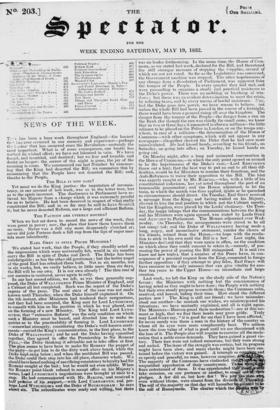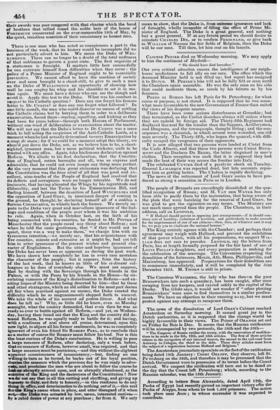NEWS OF THE WEEK.
This has been a busy week throughout England—the busiest th:t. has ever occurred in our memory and experience—perhaps the busiest that has occurred since the Revolution—certainly the most important. What is of more consequence, our bustle has wo,:ked its wished effect; we have not laboured in vain. We have feared, and trembled, and doubted; but we fear and tremble and doubt no longer: the sorrow of the night is gone, the joy of the morning is come. We commenced our last Number by announc- ing that the King had deserted the Bill; we commence this by announcing that the People have not deserted the Bill; and, thanks to the People, THE BILL IS NOW SAFE!
_
Yet must we do the Kinci. justice : the imputation of inconsis- tency, in our account of last week, was as to the letter true, but as to the spirit incorrect. The disclosures in Parliament have re- lieved his Majesty from a charge which it was extremely painful for us to believe. He had been deceived in respect. of what really constituted. the Bill; and in ..so. :far may. be said to have deserted it; but he never deserted Reform, nor a large and efficient Reform.
THE FACTION ARE UTTERLY ROUTED!
When we last sat down. to record the news of the week, they were great in power; now, the place that knew them knows them no more. Never was a full cup more desperately clutched at; never did jade Fortune dash a full cup from the lips of eager mor- tals more relentlessly.
EARL GREY IS STILL PRIME MINISTER!
We stated last week, that the People, if they steadily acted on the impressions which were universally felt, would in six months carry the Bill in spite of Duke and Devil. The Duke haS been indefatigable; so has the other old gentleman ; but the better angel ofthe good Earl has rebuked them both. Not in six months, not in six weeks, but, we -verily believe, in little more than six days, the Bill will be our own. It is our own already ! The thin rear of our enemies is scattered, never again to rally. In our last second edition, we left, as was then generally sup- posed, the Duke of WELLINGTON Prime Minister of England, and a Cabinet all but completed. Such was the report of the Duke's organs of the press. The real state of the case was not made known until Thursday, when the Duke himself explained it. On the 9th instant, after Ministers had tendered their. resignations, and they had been accepted, the King sent for Lord LYNDHURST, to consult with him on the position in which he was placed, and on the.fortaing of a new Ministry. The King told Lord LYND- HURST, that ".extensive Reform' was the only condition on which such a Ministry must be based; and directed him to make in- quiries as to the practicability"of forming it. Lord LYNDHURST —somewhat strangely, considering the Duke's well-known senti- ments—carried the King's communication, in the first place; to the Duke of WELLINGTON; and he and the Duke having consulted together, they agreed to offer the Premiership to Sir ROBERT PzEL.,-tlie Duke, thinking it advisable not to take office at first. The plan-seems to have been to make Sir ROBERT the puppet of the party—to get him to do the dirty work above board, while the DUltekept.snug below; and when the mutilated Bill was passed, the Duke could then step into his old place, character whole. We should have heard nothing of sacrificing consistency toloyalty had Sir ROBERT caught at the bait; but he would not even nibble. When Sir ROBERT point-blank refused to accept office on his Majesty's terms, LoNd LYNDHURST'S neaotiatiOnS were brought at inied to a stop'. He had communicated with Mr. BARING," and .received a half phfthise of leis support,—with. Lord CARNARVON, and; per- haps Lord WINCHILSEA and the Duke of BUCKINGHAM : he says about six. Tlie subordinates were ready and willing, lilt- there _ . . was no leader. forthcoming. In the mean time, the House of Com- mons, as we stated last week, declared for the Bill, and threatened the still stronger measure of stopping the supplies, several' Of which are not yet voted. So far as the Legislature was concerned; the Government machine was stopped. The utter hopelessness (if any change from a dissolution pf. Parliameht;. was apparent from- the temper of the People. In every quarter they had met, and were proceeding to organize a steady and .practical resistance to the Duke's power. There was no mobbing dr breaking- of win- dows ; but there was au evident determination to meet the crisis; • by refusing taxes, and by every'means of lawful resistance., Nay, had the Duke gone into power, we have reason to believe, hat unless the whole Bill had been pasted in the course of a fortnight, -• there would have been a general rising all over the kingdom. The danger from the temper of the People—the danger from a run-on the Bank (for though the run was chiefly for small sums, we know that in two or three days it amounted to above a million)—the little reliance to be placed on the Police in London, or on the troops any- where, . in case of a collision—the determination of the House of Commons—with other symptoms, which will not appear in any newspaper—altogether showed the Duke 'that he had once more miscalculated. He had kissed hands, according to his friends, on Saturday, on going into office; on Tuesday, he kissed hands on going cut. On Monday night, after a long and animated conversation in the House of Commons,—in which the only point agreed on seemed to be the hopelessness of the Duke's case,—Lord EBRINGTON threw out a hint, that the best way to put an end to all their dif- ficulties, would be for Ministers to resume their functions, and the Anti-Reformers to waive their opposition to' the Bill. The hint was eagerly caught at by Mr. BARING,—who, with a little of his constitutional indecision, has yet acted throughout the part of an honourable peacemaker; and the House adjourned, to let the train, to which the match was thus applied, ignite or be quenched as circumstances should direct. On Tuesday, Earl GREY received a - message from the King; and having waited on his Majesty, showed to him the real position in which not the Cabinet merely, but the Kingdom, were placed by the Lords obstinacy. On Tues- day, the happy tidings that the communications betWeen the King and his Ministers were again opened, was stated by Lords GREY and ALTHORP to Parliament. The Houses adjourned over Wed- nesday. On Thursday, the arrangements were stated to be all but compl,,Ied; and the Duke of WELLINGTON having made a long, angry, and inconclusive statement, amidst the cheers of his Mends, retired from the House,—we hope with the resolu- tion to stick to his own until the Bill is a law. Last night, the Ministers declared that they were again in office, on the condition onwhich alone they could consent to retain it, namely; 'a pos- sessing the power of passing the Bill unimpaired. It is said we know not how truly), that a number of the Peers have, in con- sequence of a personal request from the King, consented to forege further opposition : if they attempt to play false, Earl GREY -will have recourse to the only measure that can give 'vitality for ano- ther ten years to the Upper House—an immediate and large creation.
Last week, we left the King on the shady side of the Nation's favour; the Ministers with nothing but the consciousness of having acted as they ought to have done ; the People with nothing but their own steady purpose to console them; the Corninons calm, resolved; and honest, biding their time. How stand the different parties now ? The King is still our friend: we have misunder- stood one another-Aie mistook our wishes, we misinterpreted his intentions; we • have mutually explained, and all is right again. The • Ministers—Heaven grant them moderation !—are at this nio- • ment so high; that we fear'their heads may grow giddy. Truly may Lord GREY say, " it is good for me that I have been afflicted, for never surely was there a man in the hiStory of the country on whom all its eyes were more complacently bent. We seldom know the truevalue of -what is good until we are threatened with the loss of it: The People alse will require to exercise all the mode- ration that a noble Ouse demands. They have gained a great vie- . tory. Their foe's were not indeed numerous, but they were strong and united. The issue of the struggle was certain, but its progress - might have been slow, and many checks might have been sus- tained before the victory was gained.-. 'A' triumph so _co and sospeedy and peaceful, no man, however sanguine, The majority of the Commons have .vindicated the unqualified approbation of their 'countrymen. ttri fears 'entertained of them. It: was apprehended - take: occasion, on one pretence or another,-to sneir their pledges: ,A . few did so, but 11psi:. fet ! • We pi ;W00...+04 even Without blame, were' absent from the diviSi fir.:71usy. The roll of, the on that: day will hereafter li Ant:ed tcf:h'S the of Runnymede. The charter which the
1).Y
their swords was poor compared with, that charter which the band of brothers that rallied round the, noble heir of the house of FORTESCUE consecrated on the ever-memorable 10th of May, by the quiet, resistless assertion•of their consistency as honest men.



























